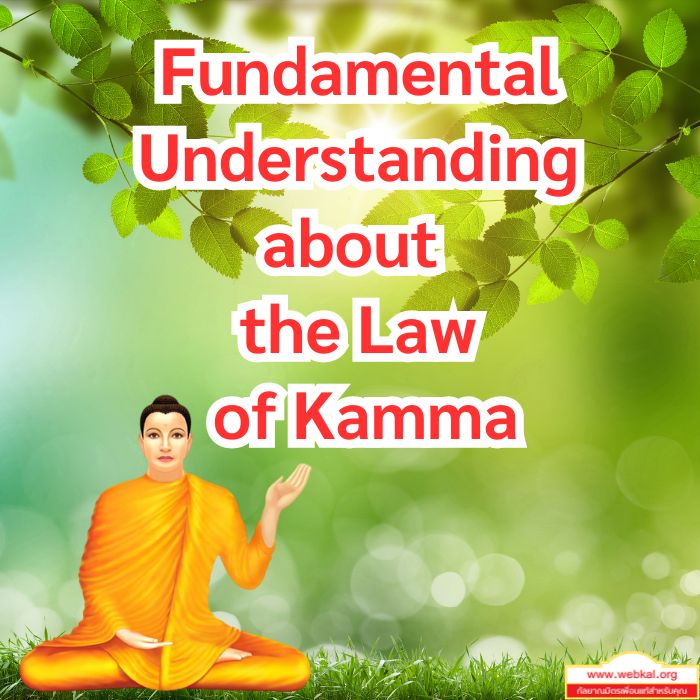
Fundamental Understanding about the Law of Kamma
Most human beings on earth have no idea why they are born and what causes the particular circumstances in their lives. Some people belong to a wealthy family. Some people belong to a poor family. Some people are healthy. Some people are
handicapped. Some people are good-looking. Some people are homely. And the list goes on. What every human being has in common is the fact that we must all die. However, we have no idea when and how we will die. As a result, our existence is plagued by many puzzling questions. Scientists and psychologists have tried to theorize and rationalize our existence. They also have tried to understand the factors which influenced human behavior and different theories have been postulated. The fact is the answer to human existence and human behavior has been clearly stated in the Lord Buddha's Teachings, since the Lord Buddha could penetrate the entire truth about life and existence as a result of His Enlightenment. Therefore, He is the best personage to tell us how to best conduct our lives for our safety and for the fulfillment of our life's true purpose, which is to seek Enlightenment.
It is crucially important that every individual studies the Lord Buddha's Teachings in earnest in order to gain the most important knowledge of all here and now. Only this most important body of knowledge, which helps us to increasingly accumulate more and more wholesome deeds, can help us to meet with success and happiness all through eternity.
The Law of Kamma is the law of action, the law of cause and effect. It is the law of nature. Nature in this case is defined by the fact that a wholesome thought results in a wholesome deed and an unwholesome thought results in an unwholesome deed. The Law of Kamma is very real and very relevant to life in that a particular cause leads to a particular effect. Kamma encompasses physical, verbal, and mental deeds regardless of whether they are good or bad, intentional or unintentional, frequent or infrequent. Every deed yields its consequences. Some of the consequences may be experienced right here and now. Others are experienced in the hereafter. The Law of Kamma is absolutely exact and no one is exempt from it. It governs human beings of every race, creed, and language regardless of where they are: on land, on the water, in the air, on the moon, in space. No one can escape from the Law of Kamma. Even our current Lord Buddha had to live with the consequences of His past Kamma which had been accumulated during His pursuit of Perfections throughout countless lifetimes. Our Kamma follows us everywhere like a shadow. The rules and laws thought up by human beings contain loopholes and may change from year to year, but the Law of Kamma never changes and contains no loopholes. According to the Law of Kamma, it states that a good deed yields good consequences and a wicked deed yields ill consequences. Ultimately, there is no such thing as a good deed yielding ill consequences and a bad deed yielding good consequences.
Suppose in each lifetime, an individual accumulates both good and bad Kamma for a total of 1,000 times, when these Kamma give their consequences, the number of consequences can increase significantly compared to the original Kamma of 1,000. It is not unlike a single fruit tree which can yield thousands of fruits within its lifetime. Each one of us is trapped in a maze of accumulated Kamma that is waiting its turn to give its consequences one lifetime after another. Therefore, it is not possible for us to escape this round of rebirth as long as we are still lugging around with us all of these past accumulated Kamma, which are individually unique. It is also a universal fact that we reap what we sow.
'Samsara' is an ancient term that means ajourney, a recycling. It essentially implies a long journey, a continuous recycling or round of rebirth from one plane of existence to another until such time as all defilements can be extinguished. For example, one is a human being in this lifetime and after one dies one is reborn in the States of Happiness. After one ceases to be in the States of Happiness, one will be reborn again. One may be reborn in the Human Realm or may even be reborn in the States of Unhappiness. This recycling is called the round of rebirth and it occurs continuously.
There are certain phenomena which activate and perpetuate the process of the round of rebirth and these include:
Defilements or gloominess means evil which lies latent in our consciousness. It causes our mind to become clouded and impure. Under the dictate of defilements, a living being cannot be itself but is forced by its defilements to perform all kinds of
deeds. There are two key drivers in this process. The first one is 'Kileskam.' It means the latent evil which forces one to commit certain wrongs in order to obtain the objects of one's desire. The second key driver is 'Vatthukam.' It means desirable objects which include matter, sound, smell, taste and touch.
Kamma or deeds: They include physical, verbal, and mental deeds and can be either good or bad.
Fruits or consequences: They mean theconsequences of Kamma.
Defilements, Kamma and the consequences of Kamma are sometimes referred to as the three causes of the round of rebirth or 'Trivatta.' Defilements are the main factor that drives one to perform physical, verbal, and mental misdeeds. Once a deed is done, however great or small, there naturally follows its consequences.